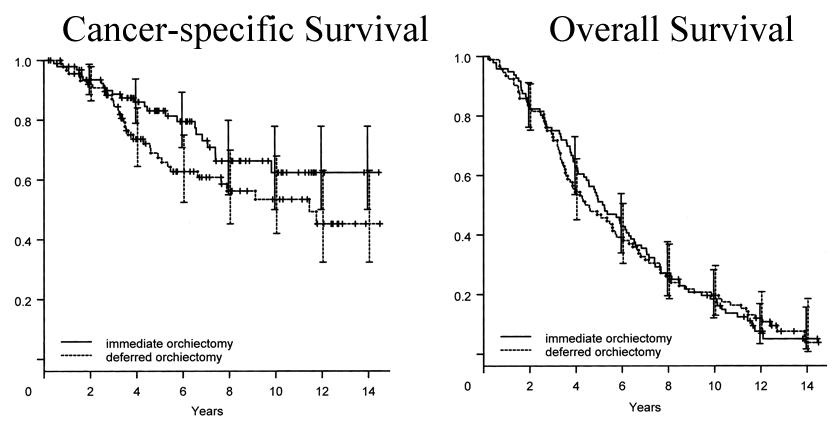Immediate Versus Deferred Hormonal Treatment for Patients With Prostate Cancer Who Are Not Suitable for Curative Local Treatment: Results of the Randomized Trial SAKK 08/88Hormonal therapy for prostate cancer has been used for more than 60 years in patients who are not candidates for definitive treatment with curative intent. Although there is general agreement that it delays disease progression and is effective for palliation of symptoms, controversy exists about when it should be initiated and whether it prolongs survival. Advocates of early hormonal treatment note that delay in progression translates into reduction of symptoms and prolonged survival. Proponents of delayed treatment claim that if patients are observed closely, treatment can be initiated before severe symptoms or complications develop, and that they are spared the adverse effects of hormonal therapy for long periods and, indeed, some may never need it. They also cite studies showing no survival advantage with early treatment. We evaluated the timing of hormonal therapy with immediate or deferred subcapsular orchiectomy to determine whether there is a significant difference in overall survival, symptom-free survival, or incidence of complications. To determine if immediate hormonal therapy is advantageous compared with deferred treatment in newly diagnosed asymptomatic prostate cancer patients who, for any reason, were not candidates for curative local treatment. Between February 1988 and February 1992, 197 patients with a median age of 76 years (range, 56 to 86 years) were randomly assigned to receive either immediate or deferred orchiectomy on symptomatic progression. The two groups did not differ significantly in clinical or laboratory parameters; 67% had T3-4 tumors and 20% had lymph node metastases. Patient accrual was stopped prematurely because of a similar competing trial. Therefore, observation time was prolonged to achieve the desired number of events and statistical power. RESULTS: Deferred orchiectomy was necessary in 58% of the patients. Median time to disease progression was 2.8 years less than for patients with immediate orchiectomy. However, overall pain-free time from random assignment to symptomatic progression after immediate or deferred orchiectomy, and performance status, were identical in both groups. Cancer-specific survival tended to be longer in the immediate group (P = .09) but there was no difference in overall survival between the two groups (P = .96). The median hemoglobin value decreased significantly after immediate orchiectomy (P < .001). CONCLUSION: For elderly, asymptomatic patients not undergoing curative local treatment, we were unable to show any major advantage of immediate compared with deferred hormonal treatment regarding quality of life or overall survival in our limited number of patients. Disabling complications were prevented in the deferred-treatment arm by careful follow-up; 42% of these patients never required any tumor-specific treatment. |
